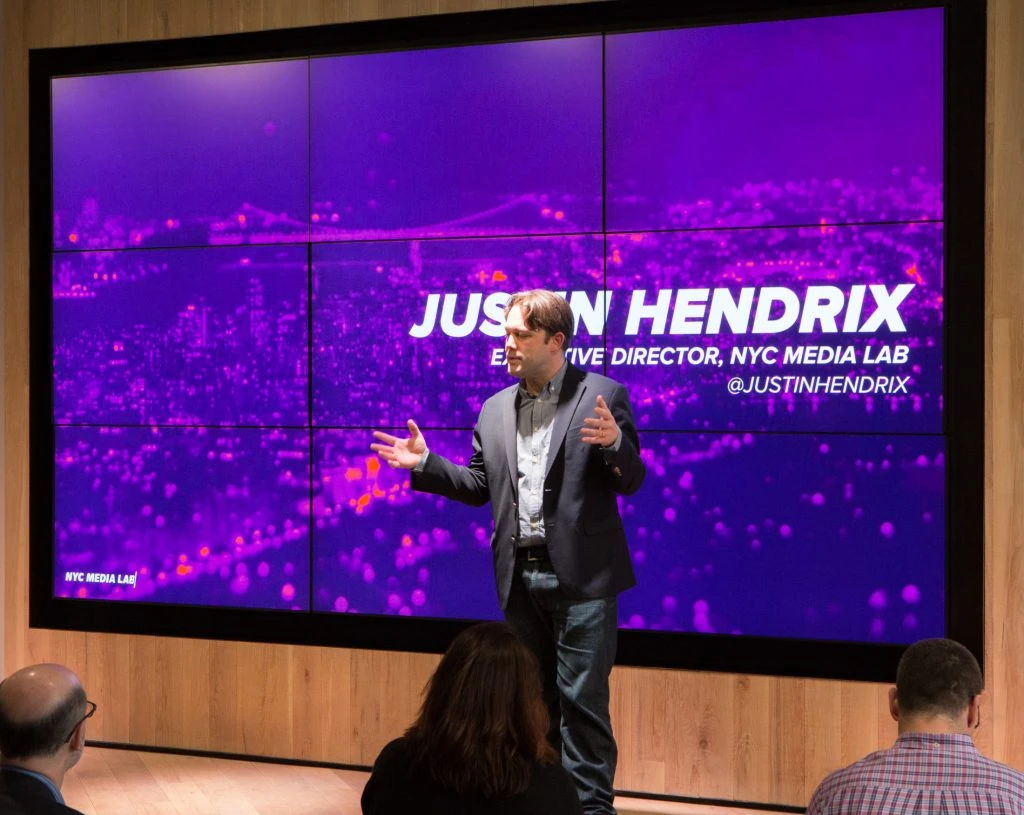Machines + Media: Sharing Information in the Digital Age
April 24, 2017

Who is creating the media you consume? For the most part, it’s likely a team of experienced journalists, razor-sharp video producers and analysts with a finger on the pulse of the news. And in today’s digital age, machines play a significant part in both the production of information and in delivering it from traditional news sources to social media platforms.
“In the last ten years, the role of computers and automation in the way news is produced has only increased,” declares Gideon Mann, the head of Data Science at Bloomberg. “In part, it’s down to the fact that machine learning has gotten a lot better. The other reason is the growth of social media and the way people talk about and disseminate news. The combination of these two things makes it critical that the industry have a conversation about the role of computers in news and the media.”
As our dependence on machines continues to rise, how will the role of humans in journalism and other fields be affected? In the future, will humans even be involved at all? While these questions may seem futuristic or even a bit disturbing, they are already being addressed. For instance, the Bloomberg-sponsored Machines + Media conference on Tuesday, April 25, organized by NYC Media Lab and hosted by Bloomberg, will dive into the specifics of how data and machines are becoming ever more intertwined with media production, distribution and consumption.
“Machines + Media will be all about looking at how various technologies are changing the way we interact with information, with entertainment, with one another,” says Justin Hendrix, executive director at NYC Media Lab. “We’re going to look at new technologies — applications such as artificial intelligence and conversational interfaces. And we’re going to look at how these things will evolve over the next few years.”

With accelerating growth in computing power and an increasing depth of available data, media applications will only become more powerful. For example, deploying natural language generation (NLG) systems will enable the automated creation of news stories. At the same time, bots will disseminate personalized news to consumers, while AI automatically develops photo-realistic images or videos to accompany them. If tech can power this kind of output, will human workers end up being sidelined?
“I don’t think the dystopian future is where we’re heading. This is going to be more about racing with the machines than being entirely subordinate to them,” Hendrix believes. “We will have two sessions at Machines + Media that talk about this topic. One will look at how we are augmenting workflows in media to take advantage of machines and what that will mean for organizations in terms of the types of people they will employ. The other will look at it from the perspective of designing for humans and what it means to use data-driven tools to design media products for people.”
Right now, fake news is one of the biggest talking points within the media industry. Hendrix believes there’s an overall pessimism, with an underlying perception that the tools used to create fake news are advancing quicker than those designed to contain it. This skepticism is fostering an exciting conversation about how new technologies will engender accuracy.
“One of the reasons that, as a global finance, media and tech company, we care about fake news is that our customers rely on an accurate picture of the world to make smart business or investment decisions,” asserts Mann. “They want to know what the actual truth is because that’s going to affect the pricing of their financial transactions. There’s tremendous potential for automated technology to help distinguish fake news, rumors, falsified conspiracy theories — and do that in a way that allows our clients to get right to the facts.”
An event like Machines + Media reveals how the intersection of media and technology is becoming increasingly important, and will require greater collaboration among businesses of all types. While startups may move especially fast in terms of specialized technologies, there are also benefits to partnering with larger organizations that have the infrastructure in place to ramp up operations quickly.
“The media industry has been slow to imagine the R&D priorities of the big tech companies,” claims Hendrix. “This event is about making sure they are creating together and thinking together about the implications of these technologies. We will talk about what it all means for companies and consumers. We’re dealing with tech questions, but they’re also human questions.”